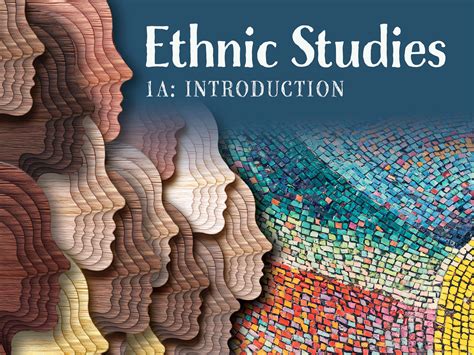Ethnic studies is an interdisciplinary field of study that examines the experiences, cultures, and histories of ethnic groups. It is a relatively new field, with most programs being established in the 1960s and 1970s.

Ethnic studies courses typically cover a wide range of topics, including:
- The history of ethnic groups in the United States
- The cultures of different ethnic groups
- The experiences of ethnic groups in different social and economic contexts
- The impact of racism and discrimination on ethnic groups
Ethnic studies is a challenging but rewarding field of study. It can be difficult to learn about the experiences of people who are different from you, but it is also an incredibly important field of study. Ethnic studies can help us to understand the world around us and to work towards a more just and equitable society.
Is Ethnic Studies a Hard Major?
The difficulty of ethnic studies as a major depends on a number of factors, including the individual student’s interests, abilities, and work ethic. However, there are some general challenges that all ethnic studies majors face.
One of the biggest challenges is the sheer amount of material that students need to learn. Ethnic studies is a broad field that covers a wide range of topics. Students need to be prepared to read a lot of books, articles, and other materials. They also need to be able to think critically about what they read and to write clearly and concisely about their findings.
Another challenge is the fact that ethnic studies can be a very emotional field of study. Students often learn about the experiences of people who have been subjected to racism, discrimination, and other forms of oppression. This can be a difficult and emotionally draining experience. However, it is also an important experience that can help students to develop empathy and compassion for others.
Overall, ethnic studies is a challenging but rewarding major. Students who are interested in learning about the experiences of people from different cultures and who are willing to work hard will find it to be a rewarding field of study.
What Are the Benefits of Studying Ethnic Studies?
There are many benefits to studying ethnic studies. Some of the benefits include:
- Increased understanding of the world around you. Ethnic studies can help you to understand the different cultures and perspectives that exist in the world. This can help you to be more tolerant and understanding of others.
- Developed critical thinking skills. Ethnic studies courses require students to think critically about the world around them. This can help you to develop your critical thinking skills, which can be useful in any career.
- Improved communication skills. Ethnic studies courses often require students to write and speak about their findings. This can help you to improve your communication skills, which can be helpful in any career.
- Increased empathy and compassion. Ethnic studies courses can help you to develop empathy and compassion for others. This can help you to be a more caring and compassionate person.
What Are the Career Opportunities for Ethnic Studies Majors?
Ethnic studies majors have a wide range of career opportunities. Some of the careers that ethnic studies majors can pursue include:
- Educator
- Social worker
- Nonprofit administrator
- Journalist
- Lawyer
- Politician
- Activist
Ethnic studies majors are also well-prepared for careers in business, government, and other fields.
Common Mistakes to Avoid When Studying Ethnic Studies
There are a few common mistakes that students often make when studying ethnic studies. Some of these mistakes include:
- Assuming that all members of an ethnic group are the same. This is a common misconception that can lead to stereotyping and prejudice. It is important to remember that every individual is unique, and that there is great diversity within any ethnic group.
- Ignoring the experiences of people from other cultures. Ethnic studies is not just about studying your own culture. It is also about studying the cultures of other people. It is important to be open to learning about new cultures, even if they are different from your own.
- Taking a passive approach to learning. Ethnic studies is not a passive field of study. It requires students to be actively engaged in their learning. This means reading, writing, discussing, and critically thinking about the material.
By avoiding these common mistakes, students can get the most out of their ethnic studies education.
Why Ethnic Studies Matters
Ethnic studies is an important field of study because it helps us to understand the world around us. It can help us to understand the experiences of people from different cultures, the impact of racism and discrimination, and the ways in which we can work towards a more just and equitable society.
Ethnic studies is also important because it can help us to develop empathy and compassion for others. By learning about the experiences of people from different cultures, we can come to appreciate the challenges that they face and the resilience that they have shown. This can help us to be more understanding and compassionate towards others, even if we do not share their experiences.
Ethnic studies is a vital field of study that can help us to understand the world around us and to work towards a more just and equitable society.
